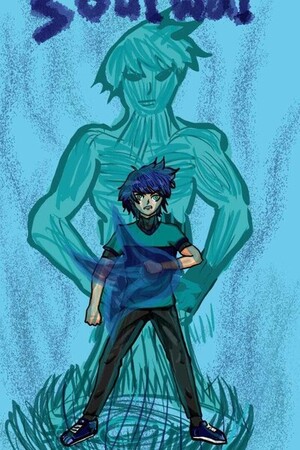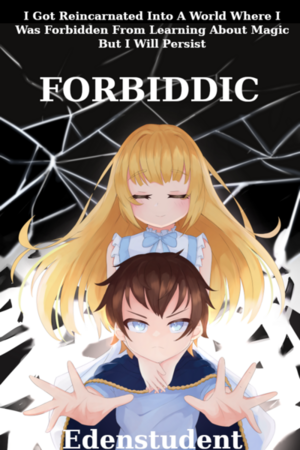Chapter 12:
Test and Encounter
SoulWars
The training field took in the pale noon light through the high openings in the wall. The air smelled of metal and leather; there was a faint hum of activity from the corrals and kitchens, but in the clearing where they trained a tense calm reigned, like the stillness before a storm. Axel held a practice sword with both hands; the wood vibrated in his palms every time he tried to strike. Sweat beaded on his forehead and his shirt clung to his back.
Lucy watched him with her arms crossed, now with the seriousness of someone who corrects for real. Beside her, Martín —the comrade assigned as sparring partner— remained alert, keeping the fine balance between being harsh and truly teaching.
“All right,” Lucy said, pacing around Axel like a judge studying a competitor. “First thing: you don’t have technique yet. That’s okay. You’re learning. But you need to understand the basics and repeat them until they hurt—or until they come out without thinking.”
Axel snorted.
“They’re coming out without thinking, but badly,” he half-joked, half-serious. “It feels like the sword has a life of its own and I don’t.”
Lucy tilted her head, amused.
“That happens. Not because the sword is alive, but because you’re not aligned. Body, mind and breath must go together. If one fails, the sword will feel rebellious.”
She stepped closer, took the hilt and with two fingers showed the correct hand placement. Axel watched closely. Lucy spoke like someone who’d taught for years, with sharp patience.
“Grip: dominant hand closest to the guard, the other hand about ten centimeters back. Don’t squeeze as if to strangle it; squeeze just enough to keep control. If you squeeze too hard you lose flexibility; too soft and it falls.”
“And the wrist?” Axel asked.
“The wrist isn’t rigid,” Lucy answered. “It aligns with the forearm. The cut comes from the shoulder and the rotation of the hips, not just the arm. Imagine you’re a whip: force starts in the core and travels to the tip. If you just pull with your arm, there’s no wave.”
Axel nodded, repeating it mentally.
“Stance: feet shoulder-width. Lead foot pointing where you want to go; rear foot perpendicular, ready to push. Front knee slightly bent. Weight balanced—fifty-fifty to start—but ready to drive forward or step back with the rear foot. Keep your back straight, chest open; look forward, not at the sword.”
Martín lifted his practice blade as if to add something.
“For blocking you should start with the blade aligned with your center. That protects your torso. But don’t put the blade directly in the line of the strike; keep it staggered and use angles. An angle makes the force slide off and lose power.”
Lucy smiled approvingly and added the final piece.
“Breathing. Inhale before the movement, exhale as you execute. The energy you’ll put into the blade isn’t magic on its own; it comes when your body and breath push. With imbuement, the difference is that breathing must be conscious: exhale and send the energy with the strike, like pushing water with an oar. You’ll feel the blade hum a little if you do it right.”
Axel tried to imitate: feet in place, grip adjusted, breath, hip twist, then the cut. The practice sword sang through the air and clashed against Martín’s block with a dry thud. It wasn’t perfect, but there was rhythm.
“Better,” Lucy said. “Not perfect, but better.”
A small warmth of victory rose in Axel’s chest. Still, fatigue arrived quickly: trying to imbue the sword with energy left him drained. Each time he put that blue spark into the hilt so the blade could cut “with soul”—as Lucy explained—it left a weariness heavier than the wood.
Lucy noticed and didn’t soften it.
“Beyond technique, Axel, what you lack is endurance. Spiritual energy holds only if the body can sustain it. If your muscles and breath don’t respond, the energy drops fast. That’s why we train strength and breathing. It’s useless to be a volcano of energy without batteries to keep it.”
Martín, watching calmly, stepped forward and took a stance.
“Again,” he ordered. “This time endurance: three rounds without stopping.”
Axel took the hits; every clash reminded him he wasn’t an expert. The sword trembled in his hands after the third exchange and his breathing was a ragged rhythm. Neither the spiritual drain nor the physical fatigue let him go. He had had two hard days since the fight; his body demanded a break.
When they finally paused, Lucy looked at him with a mixture of pride and sternness.
“You don’t have perfect technique,” she repeated, “but you’re improving. More than some folks with years of practice. Don’t underestimate that—your potential shows. Now train endurance: short sprints, uphill runs, planks. Then we come back to the sword.”
Axel, still gasping, managed a weak smile. He felt tired, yes, but also a new certainty: this wasn’t a game.
“And the others?” he asked. “I haven’t seen them in hours.”
Lucy leaned on the hilt and stared at a point on the horizon Axel couldn’t see.
“They went to investigate a nearby town. Rumor says the enemy took it.”
Axel frowned, connecting dots in his head.
“Is that town special in some way? Routes or—?”
Lucy nodded.
“Looks like transport routes and a strategic point. If you control that route you cut off supplies.”
Axel looked at her with his usual curiosity.
“Makes sense,” he said. “History works the same: control resources, control the war.”
Lucy gave him a half-smile.
“Not so out of touch; your history classes paid off.”
Before Axel could react, Martín launched a quick thrust with the practice blade. Axel saw it late and managed to raise his guard, but the strike grazed his shoulder: a blunt hit that left him breathing sharply.
“Treachery!” he protested.
Lucy rolled her eyes and laughed.
“No one will warn you in battle. Watch out for false rules: the field deceives.”
Martín apologized with a grin and a friendly slap on Axel’s back. The scene married pedagogy with reality: learn to take the hit and stand.
Meanwhile, several kilometers away, Luz, Pedro, Lexus and two comrades advanced along a track through tall grass toward the town. The day was clear, but the air carried a heaviness. Luz walked beside Pedro, worry etched on her brow.
“Are you sure about leaving them?” Luz asked quietly. “Axel still—” she cut off. “He doesn’t have full technique.”
Pedro didn’t flinch.
“Lucy knows what she’s doing, Luz. And Axel needs training time. Besides, we’ll scout and return.”
Lexus walked a little ahead, eyes scanning the horizon like someone who watches more than sees. He stopped, rifled in his pocket, then turned.
“Wait,” he said. “I’ll take a look.”
With a motion that felt almost ritual, Lexus removed the patch from his eye. The gesture made a whisper of sweat trickle along his brow, but his gaze lit with a strange glow. As he focused, the world shifted: the town’s streets appeared overlaid with iridescent lines, currents of color tracing invisible routes of energy. Men and women in the square were not just bodies—auras swelled in colors Lexus recognized through training and memory.
“What do you see?” Pedro asked, approaching.
Lexus spoke in a low voice, the one he always used for serious things.
“Soldiers patrolling in order. Several groups. And… construction. There are people not merely patrolling: they’re installing forges and metal structures. I sense smithing and assembly activity. They could be producing weapons or repairing parts.”
Pedro’s brow tightened immediately. The news spread through the group like a chill.
“Manufacturing facilities in the town,” he murmured. “So it’s not just holding ground; it’s a logistics hub.”
Luz pressed her lips.
“So they’re both controlling and arming. Civilians shouldn’t have to be mixed up in this.”
“We don’t know if the civilians are forced or complicit,” Lexus said, replacing the patch. “But forges and workshops indicate heavy materials moving. They could be setting up a supply base.”
Pedro checked his map, calculating alleys and routes.
“Set up a post nearby,” he proposed. “Cut their logistics. If we isolate them, their capacity will fall. No rush: haste kills civilians.”
Luz shot him a reproachful yet affectionate look.
“You’re an orderly idealist,” she said. “I always knew it.”
Pedro returned the look, but the tension returned fast. They went back to their task: watching and planning.
Far from there, in the dim hall of Alexis IV’s palace, the movements were silent. Alexis paced between tables lit by blue lamps. Maps and energy charts and floating projections formed a board. He didn’t waste words repeating what they already knew: Axel had been detected in the other world, his dual energy studied. But now something else caught his attention: those energies around Axel had moved.
“The energies that always surrounded that boy seem to have shifted,” he said calmly to the echoing murmurs of his aides.
Alexis rose from his seat and walked slowly to a table strewn with maps. His fingers trailed until they stopped on a spot inked dark: the City of the Flowing River.
“There…” he murmured with a twisted smile. “That place is perfect. Where the river splits and connects several transport routes. Humans depend on that current to move resources, weapons, provisions. If Axel moves, sooner or later he’ll have to pass through there.”
A kneeling subordinate dared to ask, “Shall we send scouts, my lord?”
Alexis shook his head slowly.
“No. Send those two. It will be an experiment… I want to see how quickly the boy reacts when he faces something he cannot ignore.”
The subordinate bowed his head in silence, understanding it wasn’t an ordinary mission.
Back at the refuge, training wound down into routine. Axel pushed through one more imbued cut. The blade glowed blue; for a moment the wooden practice sword seemed lighter in his hands. The drain hit immediately: his legs trembled with the effort.
Lucy, who understood bodies better than words, ordered him,
“Go hydrate and do planks. We’ll be back in half an hour to work on distance and balance.”
Axel stepped outside to catch air, throat dry and still feeling that urgent pulse. His breath was heavy when a commotion shattered the morning: voices, hurried footsteps, the sense something had gone wrong.
Lucy and Axel exchanged a look. Both dropped their blades—Axel still holding the torch out of habit—and ran down the main corridor. People clustered at the entrance; someone held a blood-soaked blanket; others tended with pale faces.
“What happened?” Lucy asked, pushing through the crowd.
In the center, two comrades were holding an unconscious girl. Her hair was a pale pink, like floating petals in a spring wind. Blood stained the fabric of her clothes; when her violet eyes opened for a moment, she looked terrified and exhausted.
Axel froze, breath catching, a sudden blush rising in his cheeks. He didn’t know why his body reacted with heat in his face; it was an ordinary, inexplicable human response in a place that had to be practical and cold.
“Bring water!” someone shouted.
The girl tried to speak, voice breaking.
“Please… help us… we were attacked—”
Her words thinned and she fainted into the arms of the comrades.
A heavy silence fell. Eyes met; Lucy leaned in to check wounds; Martín held the first-aid kit; Axel stood stunned.
He stepped instinctively forward, but Lucy stopped him with a hand on his shoulder.
“Calm down,” she murmured. “If you rush in now without thinking, you won’t help. Watch, listen, then act.”
Axel nodded, though his hands trembled with impatience and a weird mix of protectiveness and curiosity.
The girl lay unconscious; blood had tracked a dark path on her clothes. The comrades started asking where she’d come from and what happened, but they knew little: a small group had been attacked on the road, they’d left the wounded woman and fled toward the city or hidden.
Lucy brushed back a fold of the girl’s jacket and inspected her clothing. Her expression hardened.
“That outfit,” she said, “that cut and fabric—she’s from the City of the Flowing River. Those bastards are moving fast.”
Lucy looked at Axel in a low voice.
“The enemy is plotting something. I’ve got a bad feeling. Stay alert.”
Axel swallowed. The idea that war lay so close—in a roadside ambush, in a looted town, in forges that billowed smoke—hit him as sharply as any blade.
Lucy tended the girl with steady hands, feeling for superficial wounds, searching for the origin of the bleeding. She had blunt trauma and a puncture wound. It wasn’t minor.
“We need to stabilize her,” Lucy said. “Bring hot water and bandages. And fetch the medic.”
The girl made a thread of a sound and opened her eyes. Her gaze fixed on Axel; for a second the world slowed for both of them. Axel felt something—he couldn’t name it—pierce him: a story, a sorrow, a call.
“Help us,” she repeated, the plea trembling.
Pieces fell into place: the occupied town, the industrial activity, the enemy’s order, the waiting guerrilla—and Axel, still in training, trying to learn not only the cut and the guard but how to shoulder the responsibility of a world that demanded answers.
Lucy wrapped the dressing with steady hands. Axel watched, his breath resynchronizing to a different rhythm: the beat of duty and the spark of a promise.




Please sign in to leave a comment.